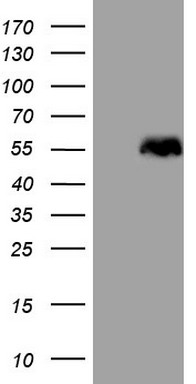SMAD1 Mouse Monoclonal Antibody [Clone ID: OTI1B9]
CAT#: CF809092
Carrier-free (BSA/glycerol-free) SMAD1 mouse monoclonal antibody, clone OTI1B9 (formerly 1B9)
Formulation: Standard
Frequently bought together (2)
Other products for "SMAD1"
Specifications
| Product Data | |
| Clone Name | OTI1B9 |
| Applications | WB |
| Recommended Dilution | WB 1:2000 |
| Reactivities | Human, Mouse, Rat |
| Host | Mouse |
| Isotype | IgG1 |
| Clonality | Monoclonal |
| Immunogen | Full length human recombinant protein of human SMAD1 (NP_005891) produced in E.coli. |
| Formulation | Lyophilized powder (original buffer 1X PBS, pH 7.3, 8% trehalose) |
| Reconstitution Method | For reconstitution, we recommend adding 100uL distilled water to a final antibody concentration of about 1 mg/mL. To use this carrier-free antibody for conjugation experiment, we strongly recommend performing another round of desalting process. (OriGene recommends Zeba Spin Desalting Columns, 7KMWCO from Thermo Scientific) |
| Purification | Purified from mouse ascites fluids or tissue culture supernatant by affinity chromatography (protein A/G) |
| Conjugation | Unconjugated |
| Storage | Store at -20°C as received. |
| Stability | Stable for 12 months from date of receipt. |
| Predicted Protein Size | 52.1 kDa |
| Gene Name | SMAD family member 1 |
| Database Link | |
| Background | The protein encoded by this gene belongs to the SMAD, a family of proteins similar to the gene products of the Drosophila gene 'mothers against decapentaplegic' (Mad) and the C. elegans gene Sma. SMAD proteins are signal transducers and transcriptional modulators that mediate multiple signaling pathways. This protein mediates the signals of the bone morphogenetic proteins (BMPs), which are involved in a range of biological activities including cell growth, apoptosis, morphogenesis, development and immune responses. In response to BMP ligands, this protein can be phosphorylated and activated by the BMP receptor kinase. The phosphorylated form of this protein forms a complex with SMAD4, which is important for its function in the transcription regulation. This protein is a target for SMAD-specific E3 ubiquitin ligases, such as SMURF1 and SMURF2, and undergoes ubiquitination and proteasome-mediated degradation. Alternatively spliced transcript variants encoding the same protein have been observed. [provided by RefSeq, Jul 2008] |
| Synonyms | BSP-1; BSP1; JV4-1; JV41; MADH1; MADR1 |
| Reference Data | |
| Protein Families | Cancer stem cells, Druggable Genome, ES Cell Differentiation/IPS, Stem cell relevant signaling - JAK/STAT signaling pathway, Stem cell relevant signaling - TGFb/BMP signaling pathway, Transcription Factors |
| Protein Pathways | TGF-beta signaling pathway |
Documents
| Product Manuals |
| FAQs |
| SDS |
Resources
| Antibody Resources |
{0} Product Review(s)
0 Product Review(s)
Submit review
Be the first one to submit a review
Product Citations
*Delivery time may vary from web posted schedule. Occasional delays may occur due to unforeseen
complexities in the preparation of your product. International customers may expect an additional 1-2 weeks
in shipping.






























































































































































































































































 Germany
Germany
 Japan
Japan
 United Kingdom
United Kingdom
 China
China




